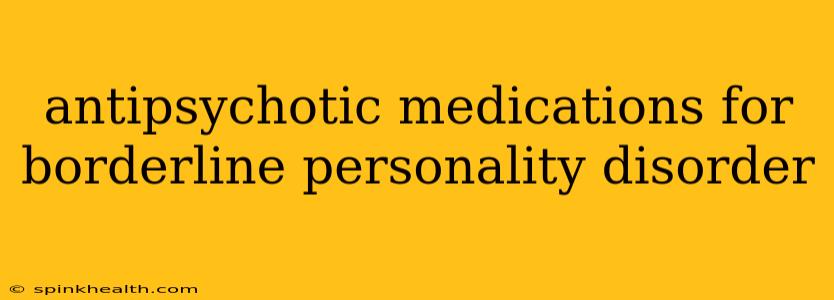Antipsychotic Medications for Borderline Personality Disorder: A Deeper Look
Borderline personality disorder (BPD) is a complex mental health condition marked by intense emotional swings, unstable relationships, and impulsive behaviors. While there's no single cure, various treatments can significantly improve symptoms. One approach sometimes considered is the use of antipsychotic medications. But it's crucial to understand their role – and limitations – in managing BPD. This isn't a simple yes or no answer; it's a nuanced discussion requiring careful consideration.
This isn't a substitute for professional medical advice. Always consult your psychiatrist or therapist before starting, stopping, or changing any medication.
What are Antipsychotic Medications?
Antipsychotics, also known as neuroleptics, primarily work by affecting neurotransmitters in the brain, particularly dopamine and serotonin. They're often used to treat conditions like schizophrenia and bipolar disorder, where psychosis (loss of contact with reality) is a prominent feature. In lower doses, some antipsychotics can also be effective for managing certain symptoms associated with BPD.
When are Antipsychotics Used in BPD?
Antipsychotics aren't a first-line treatment for BPD. They're generally considered when other therapies, like dialectical behavior therapy (DBT) and mentalization-based therapy (MBT), haven't adequately addressed specific symptoms. This is especially true when someone experiences:
- Severe mood swings: Intense emotional instability that disrupts daily life.
- Episodes of psychosis: Brief periods where they lose touch with reality, experiencing hallucinations or delusions. These are less common in BPD but can occur.
- Impulsivity leading to self-harm or aggression: Uncontrollable urges that result in harming oneself or others.
- Treatment-resistant aggression: When aggression doesn't respond to other therapies.
The use of antipsychotics in BPD is often targeted towards specific, distressing symptoms, rather than attempting to treat the disorder as a whole.
What Types of Antipsychotics Might Be Prescribed?
Several types of antipsychotics exist, including first-generation (typical) and second-generation (atypical) antipsychotics. A psychiatrist will consider several factors—including the individual's specific symptoms, overall health, and potential side effects—before prescribing. Examples of atypical antipsychotics sometimes used (though often off-label) include risperidone, olanzapine, quetiapine, and aripiprazole. The choice of medication and dosage will be highly personalized.
What are the Potential Side Effects?
Antipsychotics can come with side effects, some mild and others more severe. These can include:
- Weight gain: A common side effect, especially with some atypical antipsychotics.
- Drowsiness: This can impact daily functioning.
- Metabolic changes: Increased risk of diabetes and high cholesterol.
- Movement disorders (extrapyramidal symptoms): These can range from restlessness to muscle stiffness and involuntary movements.
- Increased risk of developing diabetes: Regular monitoring of blood sugar is crucial.
It's vital to discuss potential side effects openly with your doctor. Early intervention and adjustments in medication can sometimes minimize or manage these side effects.
Are Antipsychotics a Long-Term Solution for BPD?
Antipsychotics are generally not intended for long-term use in managing BPD symptoms unless specific, persistent symptoms warrant their continued use. The goal is often to manage acute episodes and then gradually reduce or discontinue the medication as other therapies take effect. Talk therapy remains the cornerstone of BPD treatment.
What Other Treatments are Used for BPD?
While antipsychotics may play a role in managing certain symptoms, they are not a standalone treatment for BPD. The most effective approach usually combines psychotherapy with medication management. Key therapies include:
- Dialectical Behavior Therapy (DBT): Teaches coping skills for managing emotions and improving relationships.
- Mentalization-Based Therapy (MBT): Focuses on improving the ability to understand one's own and others' mental states.
- Schema-Focused Therapy: Addresses underlying maladaptive beliefs and patterns.
A comprehensive treatment plan, developed in consultation with a mental health professional, is essential for managing BPD effectively.
Can Antipsychotics Cure Borderline Personality Disorder?
No, antipsychotics cannot cure BPD. They can help manage specific, distressing symptoms, but they don't address the underlying causes of the disorder. Long-term recovery requires a comprehensive approach that includes psychotherapy, medication management (when necessary), and a strong support system.
Remember: This information is for educational purposes only and shouldn't be considered medical advice. Always consult with a qualified mental health professional for personalized guidance and treatment related to BPD.

